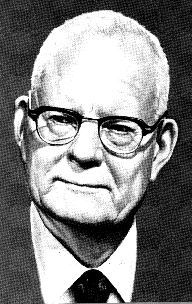| My Blog Site |  |
whsblog.com OHS and Safety | |
|
||
William Edwards Deming
Deming made a significant contribution to Japan's later reputation for innovative, high-quality products, and for its economic power. He is regarded as having had more impact upon Japanese manufacturing and business than any other individual not of Japanese heritage.
Key principles Deming offered fourteen key principles to managers for transforming business effectiveness. The points were first presented in his book Out of the Crisis. Although Deming does not use the term in his book, it is credited with launching the Total Quality Management movement. 1. Create constancy of purpose toward improvement of product and service, with the aim to become competitive, stay in business and to provide jobs. 2. Adopt the new philosophy. We are in a new economic age. Western management must awaken to the challenge, must learn their responsibilities, and take on leadership for change. 3. Cease dependence on inspection to achieve quality. Eliminate the need for massive inspection by building quality into the product in the first place. 4. End the practice of awarding business on the basis of a price tag. Instead, minimize total cost. Move towards a single supplier for any one item, on a long-term relationship of loyalty and trust. 5. Improve constantly and forever the system of production and service, to improve quality and productivity, and thus constantly decrease costs. 6. Institute training on the job. 7. Institute leadership. The aim of supervision should be to help people and machines and gadgets do a better job. Supervision of management is in need of overhaul, as well as supervision of production workers. 8. Drive out fear, so that everyone may work effectively for the company. 9. Break down barriers between departments. People in research, design, sales, and production must work as a team, in order to foresee problems of production and usage that may be encountered with the product or service. 10. Eliminate slogans, exhortations, and targets for the work force asking for zero defects and new levels of productivity. Such exhortations only create adversarial relationships, as the bulk of the causes of low quality and low productivity belong to the system and thus lie beyond the power of the work force. 1. Eliminate work standards (quotas) on the factory floor. Substitute with leadership. 2. Eliminate management by objective. Eliminate management by numbers and numerical goals. Instead substitute with leadership. 11. Remove barriers that rob the hourly worker of his right to pride of workmanship. The responsibility of supervisors must be changed from sheer numbers to quality. 12. Remove barriers that rob people in management and in engineering of their right to pride of workmanship. This means, inter alia, abolishment of the annual or merit rating and of management by objectives. 13. I nstitute a vigorous program of education and self-improvement. 14. Put everybody in the company to work to accomplish the transformation. The transformation is everybody's job. "Massive training is required to instill the courage to break with tradition. Every activity and every job is a part of the process."
Seven Deadly Diseases The "Seven Deadly Diseases" include: 1. Lack of constancy of purpose 2. Emphasis on short-term profits 3. Evaluation by performance, merit rating, or annual review of performance 4. Mobility of management 5. Running a company on visible figures alone 6. Excessive medical costs 7. Excessive costs of warranty, fueled by lawyers who work for contingency fees "A Lesser Category of Obstacles" includes: 1. Neglecting long-range planning 2. Relying on technology to solve problems 3. Seeking examples to follow rather than developing solutions 4. Excuses, such as "our problems are different" 5. Obsolescence in school that management skill can be taught in classes 6. Reliance on quality control departments rather than management, supervisors, managers of purchasing, and production workers 7. Placing blame on workforces who are only responsible for 15% of mistakes where the system designed by management is responsible for 85% of the unintended consequences 8. Relying on quality inspection rather than improving product quality
Deming's advocacy of the Plan-Do-Check-Act cycle, his 14 Points and Seven Deadly Diseases have had tremendous influence outside manufacturing and have been applied in other arenas, such as in the relatively new field of sales process engineering.
Deming quotes "There is no substitute for knowledge." This statement emphasizes the need to know more, about everything in the system. It is considered as a contrast to the old statement, "There is no substitute for hard work" by Thomas Alva Edison.
"Experience by itself teaches nothing." This statement emphasizes the need to interpret and apply information against a theory or framework of concepts that is the basis for knowledge about a system. It is considered as a contrast to the old statement, "Experience is the best teacher" (Deming disagreed with that). To Deming, knowledge is best taught by a master who explains the overall system through which experience is judged; experience, without understanding the underlying system, is just raw data that can be misinterpreted against a flawed theory of reality.
"The problem is at the top; management is the problem." Deming emphasized that the top-level management had to change to produce significant differences, in a long-term, continuous manner. As a consultant, Deming would offer advice to top-level managers, if asked repeatedly, in a continuous manner.
“Short-term profits are not a reliable indicator of performance of management. Anybody can pay dividends by deferring maintenance, cutting out research, or acquiring another company” A good manager must take a long term view and not go for the quick-fix.
|
All information is of a general nature. Readers are advied to make
their own enquiries before relying on any material in these
pages
 William Edwards Deming (1900 – 1993) was an American statistician, professor,
author, lecturer, and consultant. He is perhaps best known for the
William Edwards Deming (1900 – 1993) was an American statistician, professor,
author, lecturer, and consultant. He is perhaps best known for the 